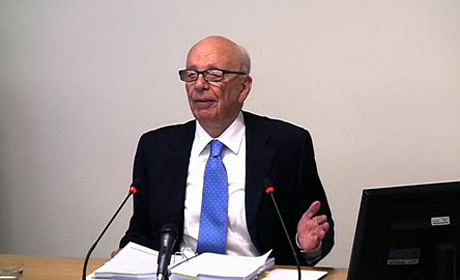Rupert Murdoch’s first day of evidence to the Leveson inquiry covered a wide range of subjects, including his personal and professional interests, his thoughts on politicians and issues of newspaper ethics.
On newspaper ethics:
All of us regret that some of our colleagues fell far short of what is expected of them. I feel great personal regret that we did not respond more quickly or more effectively.
There have been abuses shown. I would say there are many other abuses but we can all go into that in time.
I don’t believe in using hacking. I don’t believe in using private detectives – it’s a lazy way of reporters not doing their job.
Reference to the infamous “It Woz the Sun Wot Won It” front page after the 92 election:
It was tasteless and wrong for us. We don’t have that sort of power.
Response to question on attacks made by the Sun on Neil Kinnock:
It was fair to attack his policies and even sometimes the way he expressed himself. I thought the Sun’s front page on the eve of the election was absolutely brilliant. We would have supported the Labour party if it had a different policy.
On his personal motivations:
I enjoy meeting our leaders, some impress me more than others and I meet them around the world. I could tell you one or two who have particularly impressed me.
If any politician wanted my opinion on major matters they only had to read editorials in the Sun.
It’s a myth that I used the supposed political power of the Sun to get preferable treatment.
If I had been interested in pure business I would have supported the Tory party in every election. They were always more pro-business.
On his relationship with politicians:
I’ve explained that politicians go out of their way to impress the people in the press. I think it’s part of the democratic process, all politicians of all sides like to have their views known by editors in the hopes their views will be put across and they will impress people. That’s the game.
On Thatcher:
I became [a great admirer] after she was elected and I remain a great admirer
On Gordon Brown:
He later, when the hacking scandal broke, made a totally outrageous statement that he had to know was wrong and he called us a criminal organisation, because he said we had hacked into his personal medical records, when he knew very well how the Sun had found out about his son, which was very sad.
On Alex Salmond:
I don’t know much about the SNP, I just find him an attractive person.
He’s an amusing guy and I enjoy his company; I enjoy listening to him.
On the BBC:
It’s a waste of time to speak to politicians about the BBC.
Prime ministers all hated the BBC and all gave it everything it wanted.
On The Hitler Diaries:
When the editor told me very excitedly that they’d bought these British rights to documents from a very reputable German publisher, he got [historian Hugh Trevor-Roper – Lord Dacre] to go to Switzerland to examine those diaries and after some hours with them he declared he thought they were genuine.
Very close to publication, people were debating it and Lord Dacre did show doubts. The majority of us thought we should go ahead. I take full responsibility for it – it was a major mistake I made and one I’ll have to live with for the rest of my life.
For more coverage, read Journalism.co.uk’s liveblog of today’s proceedings and articles on Murdoch’s regret over phone-hacking and meetings with Thatcher about The Times.






